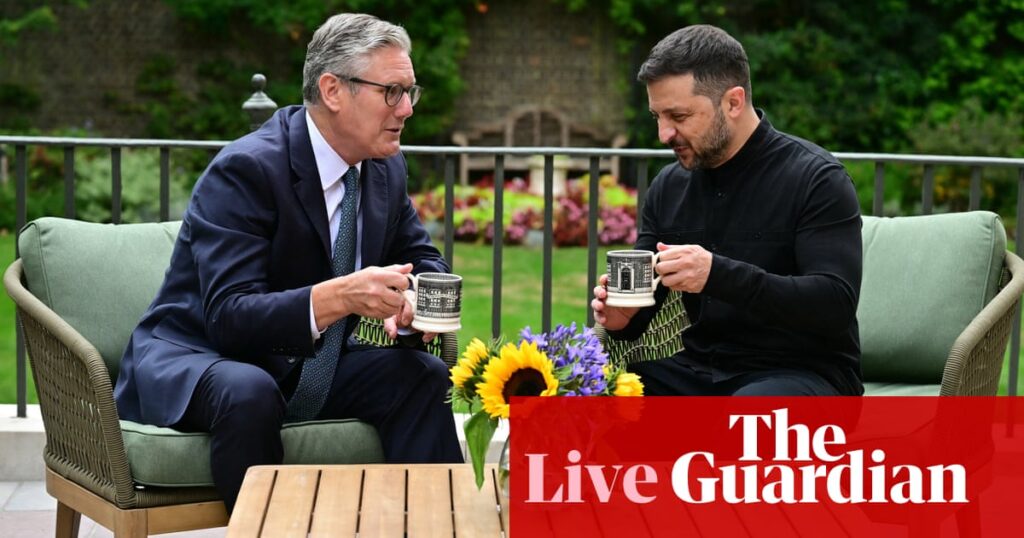Zelenskyy says he discussed security guarantees for Ukraine with Starmer at No 10 meeting
Ukrainian president Volodymyr Zelenskyy said on Thursday that he had a detailed discussion of possible security guarantees for Ukraine during a “productive meeting” with prime minister Keir Starmer.
“We also discussed in considerable detail the security guarantees that can make peace truly durable if the United States succeeds in pressing Russia to stop the killings and engage in genuine, substantive diplomacy,” he wrote on X.
Zelenskyy added that the leaders also touched on investment in Ukrainian drone production.
Alongside a video of the meeting at 10 Downing Street, Zelenskyy wrote in his social media post:
A good, productive meeting with UK prime minister Keir Starmer. We continue to coordinate our positions.
Yesterday, together with all our partners, and today in a bilateral format, we discussed expectations for the meeting in Alaska and possible prospects. We also discussed in considerable detail the security guarantees that can make peace truly durable if the United States succeeds in pressing Russia to stop the killings and engage in genuine, substantive diplomacy. It is important that, within the framework of the coalition of the willing, we should all be able to achieve effective formats for security cooperation.
We also discussed the continuation of support programmess for our army and our defence industry. Under any scenario, Ukraine will maintain its strength. Keir and I also talked about such mechanisms for weapons supplies as the PURL programme, and I urged the UK to join. Of course, we also discussed our one hundred year partnership agreement. Ukraine is preparing to ratify it in August, and as a result, we will be able to hold an expanded Ukraine-UK meeting.
A separate and important item on the agenda was investment in our drone production. We have significant potential to increase production volumes and urgently need financing for this. Drones play a decisive role on the frontline, and Ukraine’s capabilities to produce them are exceptional. Therefore, investment in such production can truly influence the situation at the strategic level. We are working with the UK and all our partners on this. Keir, thank you for your support!
Key events
Closing summary
This live blog will be closing shortly. Thank you for reading the updates and commenting below the line.
You can keep up to date with the Guardian’s UK politics coverage here.
Here is a summary from today’s blog:
-
Ukrainian president Volodymyr Zelenskyy said on Thursday that he had a detailed discussion of possible security guarantees for Ukraine during a “productive meeting” with prime minister Keir Starmer at Downing Street. “We also discussed in considerable detail the security guarantees that can make peace truly durable if the United States succeeds in pressing Russia to stop the killings and engage in genuine, substantive diplomacy,” he wrote on X. Zelenskyy added that the leaders also touched on investment in Ukrainian drone production and urged the UK to join Nato’s Prioritised Ukraine Requirements List (PURL) programme for equipment and munitions.
-
Keir Starmer and Volodymyr Zelenskyy agreed there was a “powerful sense of unity and a strong resolve” to secure peace in Ukraine during a breakfast meeting on Thursday, Downing Street said. In a readout of the meeting, a Number 10 spokesperson said they “then looked ahead to tomorrow’s talks between President Trump and President Putin in Alaska, which present a viable chance to make progress as long as Putin takes action to prove he is serious about peace”.
-
The UK economy grew at a faster rate than expected in the second quarter, official figures show, despite a slowdown from a strong start to the year amid pressure from tax increases and Donald Trump’s global trade war. Figures from the Office for National Statistics (ONS) showed growth in gross domestic product slowed to 0.3% in the three months to the end of June, down from a rate of 0.7% in the first quarter.
-
Rachel Reeves has said that Thursday’s GDP figures “show that the economy beat expectations in the second quarter of this year”. Speaking at a construction site in Doncaster, the chancellor said “there’s still more to do to make sure that people in all parts of the country benefit” from growth.
-
The Liberal Democrats urged environment secretary Steve Reed to rule out the sale of Thames Water to Hong Kong infrastructure company CKI, if it enters special administration, and for any deal to receive parliamentary scrutiny before being agreed. In a statement shared on Thursday, the Lib Dems said a “Conservative loophole” in legislation passed by the last government could allow the deal to go ahead without an automatic national security check.
-
No-fault eviction evictions by bailiffs in England have risen by 8% in the 12 months since Labour came into government, new data shows. The party has pledged to end no-fault evictions under its renters’ rights bill, which is in the final stages of going through parliament. The new data on no-fault evictions published on Thursday by the Ministry of Justice comes a week after Rushanara Ali resigned her role as homelessness minister after a report that she gave tenants at a property she owned in east London four months’ notice to leave before relisting the property with a £700 rent increase within weeks.
-
The BBC has apologised and retrospectively edited a segment of Radio 4’s Thought for the Day after the head of a refugee foundation described comments by Robert Jenrick about asylum seekers as “xenophobia”. The remarks by Krish Kandiah, a theologian who heads the Sanctuary Foundation, prompted an angry response from Jenrick, the shadow justice secretary. The BBC said it had removed “some of the language used” by Kandiah from a version posted online, saying it was not appropriate for the faith-based radio segment. However, Alf Dubs, a Labour peer who came to the UK as a child refugee, said he believed xenophobia was an accurate description of Jenrick’s comments in the Mail on Sunday last weekend.
-
Claims of an exodus of wealthy “non-doms” in response to tax rises may be overblown, according to a report that suggests that the number leaving the country is in line with official forecasts. Early monthly payroll data from HM Revenue and Customs appears to indicate that the number of non-dom departures are in line with official predictions, according to sources cited by the Financial Times.
-
Education secretary Bridget Phillipson has said that the government has no plans to change the figure of 9% interest that people pay on their student loans. Seperately, Phillipson declined to say whether the government would be prepared to allow universities an inflation-linked tuition fee increase each year to improve their financial situation.
-
Speaking on Thursday – A-level results day in England, Wales and Northern Ireland – the education secretary called the “entrenched divide” in outcomes and the lack of progress for white working-class children “concerning”. Phillipson said: “Every single young person collecting their results today should have the opportunity to pursue their dreams … but, too often, opportunities depend on background rather than talent. The entrenched divide in outcomes seen over the last few years and the lack of progress for children from white working-class backgrounds is particularly concerning.”
-
Talking to Times Radio on Thursday, Phillipson said international students made an “important contribution” to the UK’s universities and economy, and “will always be welcome in the UK”. But, she added that “some institutions, their business model has allowed them to become too dependent on international students, and therefore too open to any fluctuations that may happen around that”.
-
Phillipson also said on Thursday said that the government is “taking our time” to make sure it gets right its guidance on gender-questioning children in schools. She added that there is “no obligation” for people to call non-binary teachers Mx instead of Miss or Sir.
-
“Alarmingly high” levels of toxic forever chemicals have been detected at English airports – in some cases thousands of times higher than proposed EU safe levels – with experts raising concerns over the potential impact on drinking water sources. Seventeen airports recorded elevated levels of Pfas in the ground and surface water sample on their sites, according to unpublished Environment Agency documents, obtained exclusively by the Ends Report and the Guardian via an environmental information request.
-
The waiting list for routine hospital treatment in England has increased, NHS figures show. An estimated 7.37 million treatments were waiting to be carried out at the end of June, relating to 6.23 million patients – up from 7.36 million treatments and just under 6.23 million patients at the end of May.
-
Plans to disclose the ethnicity and immigration status of criminal suspects in the UK have been condemned by race campaigners for setting a dangerous precedent for “dog-whistle politics”, which will make “Black and brown communities more vulnerable”. The home secretary, Yvette Cooper, has welcomed new police guidelines released on Wednesday which encourage forces to release the race and nationality of those charged in high-profile cases.
-
Greenpeace have attached a new work, titled Butchered, by the renowned artist Anish Kapoor on to a Shell platform in the North Sea – the world’s first artwork to be installed on an active offshore gas site. Greenpeace said the work was a stark visualisation of the wound inflicted on humanity and the Earth by the fossil fuel industry, and aimed to represent the collective grief and pain over what has been lost, as well as a call for reparation.

Phillip Inman
Struggling Thames Water has said a new reservoir in Oxfordshire could cost more than three times the original budget, pushing the eventual cost to be covered by water bill payers to as much as £7.5bn.
In a blow to government plans for an expansion in the number of reservoirs across south-east England, the heavily indebted utility said a review of the Abingdon project had sent the estimated cost of construction from £2.2bn to between £5.5bn and £7.5bn.
Only last year, Thames told the Department for Environment, Food and Rural Affairs (Defra) that its assessment of likely costs was “robust”.
But the company has now told regulators that further tests, including of the ground and local waterways, had shown the final bill would be more than twice, and possibly three times, the current forecast.
If the reservoir goes ahead, customers will pick up the tab. About half the costs are due to be recovered from Thames Water’s 16 million customers across London and the south-east, with Affinity Water and Southern Water customers sharing the rest.
Thames customers already face a 35% increase in bills over the next five years under a settlement by the sector regulator Ofwat, while those with Affinity face a 26% lift and with Southern the rise is 53%.
The chancellor, Rachel Reeves, has pledged to build nine major reservoirs – the country’s first in 30 years – in her determination to take on “the blockers” opposing construction projects and renew the UK’s ageing infrastructure.

Rajeev Syal
Plans to disclose the ethnicity and immigration status of criminal suspects in the UK have been condemned by race campaigners for setting a dangerous precedent for “dog-whistle politics”, which will make “Black and brown communities more vulnerable”.
The home secretary, Yvette Cooper, has welcomed new police guidelines released on Wednesday which encourage forces to release the race and nationality of those charged in high-profile cases.
It is meant to combat misinformation on social media, which spread last summer after the murder of three schoolgirls in Southport. False information about the killer’s nationality, religion and asylum status fuelled widespread unrest throughout the country.
But race campaigners believe the move may encourage focus on the racial background of suspects, and will lead to further rightwing conspiracy theories when information is not released to the public.
Enny Choudhury, the co-head of legal at the Joint Council for the Welfare of Immigrants, said:
Releasing the ethnicity of everyone suspected of serious crimes will … simply fuel mistrust, deepen divisions, and make Black and brown communities more vulnerable to prejudice and harm.
Some point to cases like Southport, where rumours were quashed by releasing specific information. But building a blanket policy around this is dangerous. It turns race into a variable in policing and public debate – when we know the vast majority of serious crimes, including sexual offences, are committed by white men.
The role of the justice system should be to unite communities in pursuit of justice, not to single people out because of their ethnicity.
“Alarmingly high” levels of toxic forever chemicals have been detected at English airports – in some cases thousands of times higher than proposed EU safe levels – with experts raising concerns over the potential impact on drinking water sources.
Seventeen airports recorded elevated levels of Pfas in the ground and surface water sample on their sites, according to unpublished Environment Agency documents, obtained exclusively by the Ends Report and the Guardian via an environmental information request.
Pfas, short for per- and polyfluoroalkyl substances, are a family of about 10,000 chemicals which persist in the environment and have been linked to a range of serious illnesses. They are used in many consumer products, from frying pans to waterproof coats, but one of their most common uses is in firefighting foams.
The largest Pfas total recorded was at London Luton airport, with total Pfas in one groundwater sample, taken at a location described as “fire training lagoon two”, of 36,084 nanograms per litre.
There is no regulatory limit for Pfas in ground or surface water in the UK, but in the EU a proposed threshold is being considered of 4.4ng/l. While Luton tested for twice the number of Pfas than that included in the EU threshold, the airport’s highest total Pfas level was 8,000 times higher than the draft limit.
Among the specific Pfas detected at these 17 airports were PFOS and PFOA – two banned and toxic chemicals which, respectively, are suspected and known carcinogens.
One sample taken from “borehole four” at London Luton contained 2,555ng/l of Pfas, with 24ng/l of PFOS and 39ng/l of PFOA. This total Pfas level is more than 500 times higher than the EU’s proposed threshold.
A London Luton airport spokesperson said:
Like many airports and other industries in the UK and around the world, we are investing in and working closely with relevant agencies to assess and monitor Pfas.
Lib Dems urge environment secretary to rule out sale of Thames Water to Hong Kong’s CKI
The Liberal Democrats have urged environment secretary Steve Reed to rule out the sale of Thames Water to Hong Kong infrastructure company CKI, if it enters special administration, and for any deal to receive parliamentary scrutiny before being agreed.
CKI, which invests in power and other utility companies in the UK, is among those lining up to acquire the water and sewerage supplier if it enters a special administration regime (SAR), according to the Times.
In a statement shared on Thursday, the Lib Dems said a “Conservative loophole” in legislation passed by the last government could allow the deal to go ahead without an automatic national security check.
The Lib Dems said:
Water is not currently classed as critical infrastructure under the National Security and Investment Act, passed by the previous Conservative government, meaning foreign takeovers can happen without automatically undergoing stringent national security checks before any sale is approved.
The Liberal Democrats are calling on the government to block the sale of Thames Water to the Chinese firm, also pointing to concerns about the role of Chinese company Jingye in the recent collapse of British Steel.
Farron said:
The government is guilty of shocking weakness when it comes to China. First British Steel, then the super embassy, and now the sale of a big chunk of our critical water infrastructure. It’s time they took our critical national infrastructure more seriously.
It is unthinkable that such vital infrastructure as our own water supply should be sold by the government to a Chinese firm. Even considering such a move would show that the government is fundamentally unserious about protecting infrastructure, and about improving our water system, rivers and seas after years of abuse.
It’s equally shocking that the previous Conservative government left a gaping loophole in our national security legislation, allowing foreign takeovers of our critical water companies to go ahead without automatically going through stringent checks.
Steve Reed must rule any sale to a Chinese firm out as a matter of urgency and any potential sale of Thames Water by the government should be subject to proper parliamentary scrutiny.

Larry Elliott
One estimate last week said Rachel Reeves will need to find more than £50bn to stick to her fiscal rule with a reasonable margin for error. Even though other forecasts suggest the figure may be lower than that, there will still be difficult choices to make.
Faced with these pressures, Reeves should do two things. First, she should end the freeze on fuel duty, which has been kept in place no matter whether the cost of petrol and diesel is high or low. It is not just that Reeves could well do with the several billion pounds that a rise in fuel duty would harvest. Fuel duty is now a third lower, in real terms, than it was when Alistair Darling was at the Treasury, effectively cutting the cost of motoring and so creating incentives to drive more. Increased congestion and the potholed roads are consequences of that.
The stated rationale for the protracted freeze since 2010 is that it helps hard-pressed motorists, but the main beneficiaries have not been white-van man but the better off, who drive more, own more vehicles and buy gas-guzzling SUVs. The richest fifth of households have benefited twice as much from the fuel duty freeze as the poorest fifth. Raising fuel duty in the budget should be a no-brainer for Reeves.
But the chancellor also needs to come up with a plan for what to do once the era of all-electric vehicles finally arrives, and here there is an obvious solution: road pricing. Conceptually, there should be little problem with this idea. People expect to pay more for a train journey in rush hours. Hotels charge more for rooms on a Friday or Saturday when demand is higher. The same principle should apply to roads.
There are reasons why ministers are reluctant to grasp this nettle. Fuel duty, while a regressive tax, is easy to understand. There are no issues with privacy and surveillance, as there would be with road pricing. Governments are sensitive to charges that they are planning to wage war on motorists. Given that only 5% of vehicles are electric currently, the transition may take longer than originally envisaged. No question, doing nothing has its attractions.
But the costs of inaction will grow over time. A report by the Tony Blair Institute for Global Change (TBI) said the loss of tax revenue from cars would be £10bn by 2030, £20bn by 2035 and £30bn by 2040. This would inevitably lead to chunky tax increases. Reducing the cost of motoring by continually freezing fuel duty would lead to more and longer traffic jams. Those still driving petrol and diesel vehicles would face a triple whammy: spending longer in traffic; paying higher taxes elsewhere to compensate for the lost fuel-duty revenue from those who transferred to electric vehicles; and paying three to four times more for tax and fuel than those who drive EVs.
The education secretary has called the “entrenched divide” in outcomes and the lack of progress for white working-class children “concerning”, reports the PA news agency.
On A-level results day, Bridget Phillipson said:
Every single young person collecting their results today should have the opportunity to pursue their dreams – whether that starts with further study, university, an apprenticeship or the world of work – but, too often, opportunities depend on background rather than talent.
The entrenched divide in outcomes seen over the last few years and the lack of progress for children from white working-class backgrounds is particularly concerning.
Through our plan for change we are breaking the link between background and success, starting with reformed early years and revitalised family services, through to ambitious reforms to our school and post-16 system to make sure every young person, wherever they grow up, is truly ready for life and work.
People trying to enter the UK by hiding in refrigerated trailers present a “constant threat” to food safety, according to a report.
The study, published by logistics company Oakland International, stated that 4,415 instances of a truck or van being found with stowaways seeking to reach the UK were recorded between 2016 and 2023.
An average of nearly 100 people per month were detected infiltrating trucks entering the UK between January and September last year, PA reported.
People hiding in trailers cause delays, increased costs, potential damage to goods and disposal of produce, researchers found.
Companies transporting food, household goods and healthcare items dispose of an average of 56% of stock on an infiltrated lorry.
The value of lost stock can be up to tens of thousands of pounds, research found. This can result in revenue loss several times higher.
Volodymyr Zelenskyy has urged the UK to join Nato’s Prioritised Ukraine Requirements List (PURL) programme for equipment and munitions.
After his talks with prime minister Keir Starmer, the Ukrainian president wrote on X: “Yesterday, together with all our partners, and today in a bilateral format, we discussed expectations for the meeting in Alaska and possible prospects.
“We also discussed in considerable detail the security guarantees that can make peace truly durable if the United States succeeds in pressing Russia to stop the killings and engage in genuine, substantive diplomacy.
“It is important that, within the framework of the coalition of the willing, we should all be able to achieve effective formats for security cooperation.
“We also discussed the continuation of support programmes for our army and our defence industry. Under any scenario, Ukraine will maintain its strength.
“Keir and I also talked about such mechanisms for weapons supplies as the PURL programme, and I urged the UK to join. Of course, we also discussed our one hundred year partnership agreement. Ukraine is preparing to ratify it in August and, as a result, we will be able to hold an expanded Ukraine-UK meeting.”

Lauren Almeida
Claims of an exodus of wealthy “non-doms” in response to tax rises may be overblown, according to a report that suggests that the number leaving the country is in line with official forecasts.
In April the chancellor, Rachel Reeves, scrapped the non-domiciled tax status, which allowed wealthy individuals with connections abroad to avoid paying full UK tax on their overseas earnings.
Since then a wave of reports has suggested that changes to the status and other tax policies are triggering an exodus of high net worth individuals.
However, early monthly payroll data from HM Revenue and Customs appears to indicate that the number of non-dom departures are in line with official predictions, according to sources cited by the Financial Times
The Office for Budget Responsibility (OBR) forecast in January that 25% of non-doms with trusts would leave the UK in response to the abolition of the tax status, while 10% of those without trusts would leave. Official data suggests that this prediction was broadly correct, people briefed on the findings told the FT.
Jeremy Hunt, the chancellor’s Conservative predecessor, first announced moves to phase out the 225-year-old non-dom status that protected overseas earnings from being taxed in exchange for a flat annual fee. However, Labour took the proposals a step further by replacing them with a regime that will include overseas assets in the UK’s 40% inheritance tax rate.
Many non-doms earn income from work or their pensions in the UK, which means they appear in the PAYE (pay as you earn) figures in the payroll data that businesses send to the tax office each month. If they fall off PAYE figures, that suggests that they have left the country.
The FT reported that some of those briefed on early HMRC data said payroll figures suggested that fewer people were leaving than projected by the OBR, while others said the departures were in line with forecasts.
The numbers do not capture the movements of those non-doms who do not work in the UK, which could include some of the richest, but with a shortage of reliable data they will provide some relief to Reeves amid a debate about whether the policy could backfire.
Keir Starmer and Volodymyr Zelenskyy agreed there was a “powerful sense of unity and a strong resolve” to secure peace in Ukraine during a breakfast meeting on Thursday, Downing Street said.
In a readout of the meeting, a Number 10 spokesperson said:
The prime minister hosted President Zelenskyy in Downing Street this morning.
They had a private breakfast, where they discussed yesterday’s meetings. They agreed there had been a powerful sense of unity and a strong resolve to achieve a just and lasting peace in Ukraine.
They then looked ahead to tomorrow’s talks between President Trump and President Putin in Alaska, which present a viable chance to make progress as long as Putin takes action to prove he is serious about peace.
They agreed to stay in close touch in the coming days.
Also posting on X after the meeting in Downing Street today, Keir Starmer said of Ukrainian president Volodymyr Zelenskyy:
Great to see you, my friend @ZelenskyyUa.
Britain will always stand with Ukraine.
Zelenskyy says he discussed security guarantees for Ukraine with Starmer at No 10 meeting
Ukrainian president Volodymyr Zelenskyy said on Thursday that he had a detailed discussion of possible security guarantees for Ukraine during a “productive meeting” with prime minister Keir Starmer.
“We also discussed in considerable detail the security guarantees that can make peace truly durable if the United States succeeds in pressing Russia to stop the killings and engage in genuine, substantive diplomacy,” he wrote on X.
Zelenskyy added that the leaders also touched on investment in Ukrainian drone production.
Alongside a video of the meeting at 10 Downing Street, Zelenskyy wrote in his social media post:
A good, productive meeting with UK prime minister Keir Starmer. We continue to coordinate our positions.
Yesterday, together with all our partners, and today in a bilateral format, we discussed expectations for the meeting in Alaska and possible prospects. We also discussed in considerable detail the security guarantees that can make peace truly durable if the United States succeeds in pressing Russia to stop the killings and engage in genuine, substantive diplomacy. It is important that, within the framework of the coalition of the willing, we should all be able to achieve effective formats for security cooperation.
We also discussed the continuation of support programmess for our army and our defence industry. Under any scenario, Ukraine will maintain its strength. Keir and I also talked about such mechanisms for weapons supplies as the PURL programme, and I urged the UK to join. Of course, we also discussed our one hundred year partnership agreement. Ukraine is preparing to ratify it in August, and as a result, we will be able to hold an expanded Ukraine-UK meeting.
A separate and important item on the agenda was investment in our drone production. We have significant potential to increase production volumes and urgently need financing for this. Drones play a decisive role on the frontline, and Ukraine’s capabilities to produce them are exceptional. Therefore, investment in such production can truly influence the situation at the strategic level. We are working with the UK and all our partners on this. Keir, thank you for your support!


